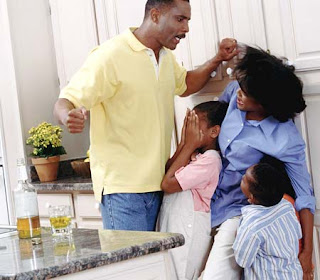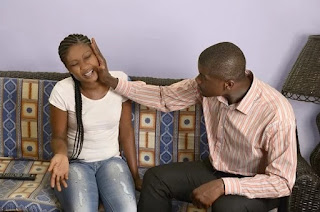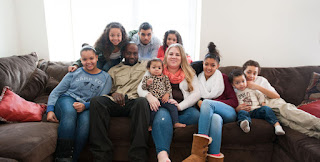Checking The Danger of Domestic Violence
Lately the local and international news is awash with stories of domestic violence, and gets
you wondering what the heck is going on.
So how do relationship experts define domestic violence?
If domestic violence is defined as an abuse
that occurs in a personal relationship between past or existing spouses,
partners, boyfriends and girlfriends, then human abuse has been with us since I can
remember. Domestic violence touches men and women of any ethnic group, race, or
religion; rich or poor; teen, adult, or elderly. But researches confirmed most
of its victims to be women. One in four women will become a victim of domestic
violence. In fact, 1 in 4 women will be a victim sometime. Abuse is also common
in teens who are dating, and occurs through jealousy and controlling
behaviours.
Growing up as a kid, I watched our next
door neighbour turned his wife into a punching bag almost on daily basis. He seemed to get a certain high from pummeling
a helpless woman. It was traumatic for
me to see this woman with swollen face and eyes that never seem to go back to
normal. We moved out of that location
and wonder till date what became of the couple. Perhaps the man finally succeeded
in beating his wife to death, who knows.
Those violent domestic scenes kept popping up in my head as I grew
older. I can’t stand violence. I hate
violence. I recoil from violence. It doesn’t
matter whether it’s domestic or public.
Violence shouldn’t be the solution to a pointless confrontation. There
should be other peaceful ways to resolve disputes amicably.
Abuser’s
weapons of terror.
A potential abuser
may bully, instill fear, threatens, blackmail, or verbally abuse to gain
power and dominate the other person. He or she may act morbidly jealous, obsessive,
controlling and chronically possessive. Early signs of abuse often occur soon
after the beginning of a relationship and may be difficult to notice initially.
Soon after the relationship takes a more serious liaison, the abuse may get eviler.
The abuser threatens, gets verbally offensive, obnoxious, name calling,
swearing, banging doors and breaking dishes, throwing things against the wall,
and other heart shattering emotional abuse, just to weaken the other person. Of
course a woman or man who sees these violent reactions is bound to take a step
back either ready to fight back or take a flight. I would do the latter,
seriously!
Physical abuse starts
with a slap which soon graduates to kicking, pushing, and strangling with time.
Sexual abuse such as forcing a person to have sex against her (his) will is
another form of domestic violence. In order to be in control, the abuser
extends the violent outburst to the victim’s children, family members, pets or even
shared friends. Financial abuse is
another weapon used, particularly when the abuser controls or withholds money
to punish or make the victim totally dependent; turning money problem into a major
cause of abuse, as well as uncontrolled alcohol consumption.
What to do if you’re an abuse victim.
Don’t waste time. Get help immediately by getting in touch with
a local domestic violence group for information and support. They can help you
find out about legal and social services in your area. Also make a visit to
your local police. If you are a teen,
talk to an adult you can trust such as your parents, family friend, or school advisor.
Many teens are not knowledgeable about life intricacies or matured enough to discern when they are being abused. So talking
to an adult may help.
Also ensure that you
know phone numbers you can call and places you can go in an emergency. Educate your children not to get in the
middle of a fight. It can be dangerous. He or she can end up getting the punch
intended for another.
And if you decide
leaving is an option, make a plan to help keep you safe. This will help when
you are getting ready to leave. Your plan might include a tucked-away suitcase with
some clothing, copies of your car and house keys, money or credit cards, and
other important documents such as international passports, driver’s license,
your children’s birth certificates and yours.
If you don’t already have a bank account, you might think of opening one
in secret.
If you want to help out an abuse victim.
The things you can do
to help include being a good listener and a caring friend. Repeat to the person
that he or she doesn’t deserve to be abused, and the abusive action is against
the law. Finally help the person to make a plan to stay safe. However, a woman in a
domestic violence may not want to leave her husband. She knows the abuser best
and knows what options are safest. This
has happened several times. Nonetheless,
make the victims of abuse know where they can get help if eventually needed.
There are reasons why the victims stay.
People who are not
abused might find it hard to understand why anyone would stay in a crazy violent
relationship. It is perceived by some people that if a person remains in an
abusive relationship, she or he must be weak or dependent. This isn’t correct. There
is more to this issue than simply leaving or staying. A woman may fear that the
abuser will take it out on her and the children, or take custody of her
children. She may be financially inadequate. She may blame herself. She
may stay for religious reasons or because she doesn’t want to break up the
family. Also, surprisingly she may still love her abuser and believe the
abusive phase will pass, same similar experience for a man who is being abused.
The harmful effects of domestic
violence.
The children are worse off in an
abusive family, since they grow to see violence as a normal way of life,
raising their chances of being violent in their relationship when they grow up,
either as abusers or as victims. As regards teenagers, they are at a greater
risk for depression, drug and alcohol use, and bad conduct.
Even pregnant women
are not absolved from abuse. As a matter
of fact gets worse when women are pregnant, therefore dangerous for mother and
the baby. For the pregnant woman the risk of infections and bleeding are high,
while the baby is at risk of low birth weight, premature birth, and death.
All victims of
domestic abuse and their families get hurt, though women are the worst hit. They
are also likely to have long-term serious health issues, such as depression,
headaches, and post-traumatic stress disorder, due to the consistent injuries
and stress sustained living with an abuser. So don’t be indifferent.
Photo Credit:
Creative Summons.











Comments
Post a Comment